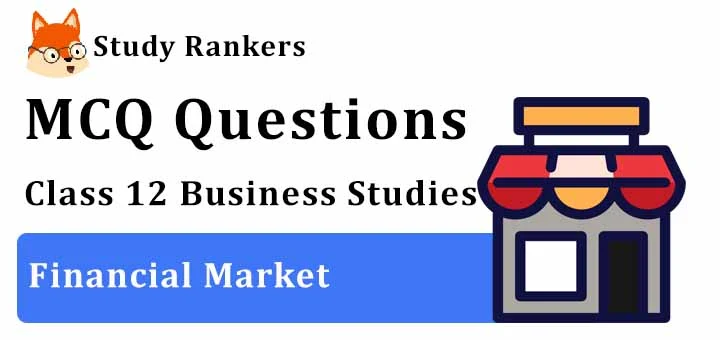MCQ Questions for Class 12 Business Studies: Ch 10 Financial Market

1. Instruments traded in capital market are__________
(a) Bonds
(b) Equity Shares and Preference Shares
(c) Debentures
(d) All of the above
► (d) All of the above
2. OTCEI was started on the lines of:
(a) NSE
(b) NYSE
(c) NASDAQ
(d) NASAQ
► (c) NASDAQ
3. Primary and secondary markets:
(a) Control each other
(b) Complement each other
(c) Compete with each other
(d) Function independently
► (b) Complement each other
4. The settlement cycle in NSE is:
(a) T + 2
(b) T + 5
(c) T + 3
(d) T + 1
► (a) T + 2
5. Only institutional investors can participate in __________
(a) Loan Market
(b) Money Market
(c) Foreign Market
(d) Capital Market
► (b) Money Market
6. Money market deals in ________
(a) Long term Securities
(b) Medium term securities
(c) Short term Securities
(d) None of the above
► (c) Short term Securities
7. A Treasury Bill is basically:
(a) An instrument to borrow short-term funds
(b) An instrument to borrow long-term funds
(c) An instrument of capital market
(d) None of the above
► (a) An instrument to borrow short-term funds
8. What is meant by Demat Account?
(a) Development Market Account
(b) Depository Participant Account
(c) Dematerialisation of of Securities
(d) Demand Depository Account
► (c) Dematerialisation of of Securities
9. To be listed on OTCEI, the minimum capital requirement for a company is:
(a) Rs. 10 crores
(b) Rs. 3 crores
(c) Rs. 25 crores
(d) Rs. 5 crores
► (b) Rs. 3 crores
10. Clearing and settlement operations of NSE are carried out by:
(a) NSDL
(b) SBI
(c) NSCCL
(d) CDSL
► (c) NSCCL
11. NSE commenced futures trading in the year:
(a) 2000
(b) 2001
(c) 2002
(d) 1999
► (a) 2000
12. The National Stock Exchange of India was recognized as stock exchange in the year:
(a) 1995
(b) 1992
(c) 1994
(d) 1993
► (d) 1993
13. _________ is not a participant in money market
(a) SEBI
(b) NBFCs
(c) RBI
(d) Mutual Funds
► (a) SEBI
14. The total number of Stock Exchanges in India is:
(a) 22
(b) 21
(c) 23
(d) 20
► (b) 21
15. When a trade bill is accepted by a commercial bank, it is known as a _____
(a) Certificate of deposit
(b) Commercial Bill
(c) Call money
(d) None of the above
► (b) Commercial Bill
16. Securities Exchange Board of India (SEBI) was established in __
(a) 1992
(b) 1956
(c) 2001
(d) 1984
► (a) 1992
17. A Treasury bill is an instrument of _____________
(a) Long term debt
(b) Short term debt
(c) Interest
(d) Dividend
► (b) Short term debt
18. Capital market deals in ___________
(a) Medium and long term securities
(b) Very short term securities
(c) Short term securities
(d) None of the above
► (a) Medium and long term securities
19. What is the meaning of right issue?
(a) Company sells the securities to some selected institutions
(b) Company offers new shares to its existing shareholders
(c) Securities are not issued to existing shareholders at all
(d) None of the above
► (b) Company offers new shares to its existing shareholders
20. _______ Market instruments enjoy higher degree of liquidity
(a) Both money and capital market
(b) Money market
(c) Capital market
(d) None of the above
► (b) Money market
21. At present only two depositories are registered with SEBI _____
(a) NSDL and HDFC
(b) NSDL and CDSL
(c) NSDL and ABSL
(d) NEFT and TDS
► (b) NSDL and CDSL
22. Which of the following is not a part of capital market?
(a) Banks
(b) Financial Institutions
(c) Stock Exchanges
(d) RBI
► (d) RBI
23. Treasury bills are also known as _____________
(a) Fixed interest Bonds
(b) Low Interest Bonds
(c) Flat Rate Bonds
(d) Zero Coupon Bonds
► (d) Zero Coupon Bonds
24. Which of the following is a method of floatation?
(a) Offer for sale
(b) Private Placement
(c) Offer through prospectus
(d) All of the above
► (d) All of the above
25. What type of instruments are traded in a Money Market?
(a) Treasury bills
(b) Commercial bills
(c) Call money
(d) All of the above
► (d) All of the above
